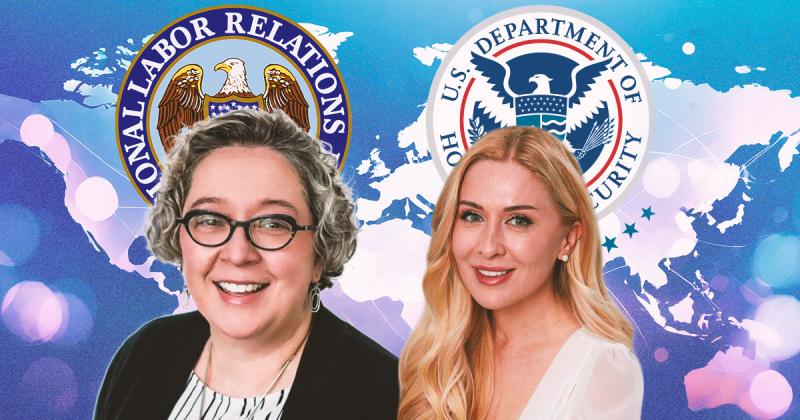
What can international athletes do to earn an income while playing for their schools?
The 2024 WNBA draft will occur on Monday, April 15 at the Brooklyn Academy of Music in New York. The league invited 15 prospects to participate in person, four of whom are international athletes, which is roughly 27%. With skyrocketing viewership, talent and international fans, it would stand to reason that NCAA basketball is an internationally recognized level of performance, but the United States Citizenship and Immigration Services (USCIS) begs to differ. Kirby Lee of USA TODAY Sports spoke with Ksenia Maiorova, Partner at Green and Spiegel, U.S. for additional insights.

College Athletes’ Status as Employees Puts Student Visas at Risk
Growing momentum toward classification of college athletes as employees of their schools is raising major questions about international students’ continued visa eligibility. Andrew Kreighbaum, Reporter for Bloomberg Law, speaks with Ksenia Maiorova, Partner at Green and Spiegel, U.S. about how employee status may conflict with student visa work limits and how workarounds to cash in on NIL are not available on the scale needed.

Urgency builds to address how employee model affects international athletes
United States immigration regulations prohibit international students in the U.S. on F-1 student visas from participating in employment. F-1 visas provide for only limited employment authorization types, most of which must be connected to the degree the athletes pursue. If an employee model is ushered in for some athletes, “overnight we could have any number of international student-athletes that are immediately in violation of their [F-1 student] status,” Ksenia Maiorova told Eric Prisbell of On3 NIL.

NLRB Rules Dartmouth Basketball Players Employees
The Dartmouth men’s basketball team faces a union election following a landmark decision by a National Labor Relations Board regional director, signaling a potential transformation in the relationship between Division I college athletes and their institutions. Nick Messineo at the Business of College Sports interviewed Ksenia Maiorova about the implications for the Dartmouth roster, the changing landscape for international student-athletes in the NCAA, and organizational or institutional advocacy.

Live Online CLE Program at Temple: “The Economics of Immigration”
On November 14, 2023, Temple Law School hosted a Live Online Continuing Legal Education (CLE) Program, “The Economics of Immigration: How Current Law Does Not Meet the Reality of Modern Business in the U.S.,” led by Jonathan Grode (LAW ’08), U.S. Practice Director of Green and Spiegel, LLP and adjunct professor at Temple. The program’s purpose was two-fold: 1) to highlight the disconnect between modern US immigration law, which has been largely static since the 80’s, and America’s evolving economic needs and 2) to discuss potential solutions for building a more rational, effective legal framework for business immigration. Learn more in this article by by Samuel M. Johnson (’25).

International student athletes still restricted from NIL deals
In 2021, the NCAA made major headlines when they announced that student athletes would finally be allowed to monetize from their name, image and likeness. The market for NIL deals, as they’re called, has exploded, bringing in an estimated $1 billion annually. But international student athletes have been left out of the lucrative deals due to visa laws. The World’s Bianca Hillier interviewed Ksenia Maiorova about NIL Immigration, misinformation about the law, and why schools are coming to her for advice due to her success in moving students from F-1 visas to P-1 visas, O-1 visas and even green cards.

Live Online CLE Program at Temple: “The Economics of Immigration”
On November 14, 2023, Temple Law School hosted a Live Online Continuing Legal Education (CLE) Program, “The Economics of Immigration: How Current Law Does Not Meet the Reality of Modern Business in the U.S.,” led by Jonathan Grode (LAW ’08), U.S. Practice Director of Green and Spiegel, LLP and adjunct professor at Temple.

Union Push Leaves Dartmouth International Players Up In The Air
What happens to the student visas for Bosnian basketball player Dusan Neskovic, his three other foreign-born Dartmouth teammates, and thousands of other international NCAA athletes if they are deemed employees? “It is going to be a disaster,” said Ksenia Maiorova, Partner at Green and Spiegel. U.S. Practice Director, Jonathan Grode, adds, “If you are remaking them as employees, there is not a lot of optionality available for foreign athletes. It creates a challenging juxtaposition, and this is already playing out within the NIL scenario with no resolution.”

Justice Department Sues SpaceX, Alleging Discriminatory Hiring Practices
Jonathan Grode, an immigration attorney with export controls expertise who serves as managing partner at the firm Green and Spiegel, said that companies like SpaceX are not in fact barred from hiring foreign nationals at all. But companies do have to seek certain visas for foreign nationals or obtain government approval when it comes to ITAR restrictions, and SpaceX is within its rights to decide not to pursue that path. Learn more.

A Glaring Controversy With Name, Image, Likeness (NIL): International Student-Athletes Can’t Cash In
Florida State University swimmer, Izaak Bastian was excited to learn student-athletes can profit from Name, Image, and Likeness (NIL) deals. His excitement died when the 2021 Olympian realized his Bahamian citizenship would get in the way. Ksenia Maiorova, a sports immigration lawyer based in Orlando, Florida, said it is almost impossible to find a NIL deal that falls under the F-1 visa requirements.